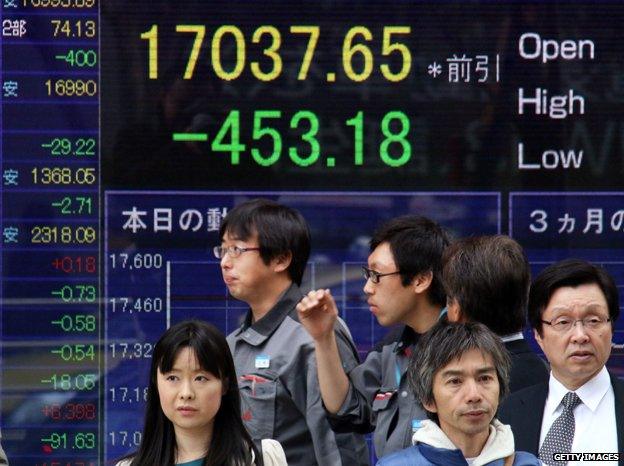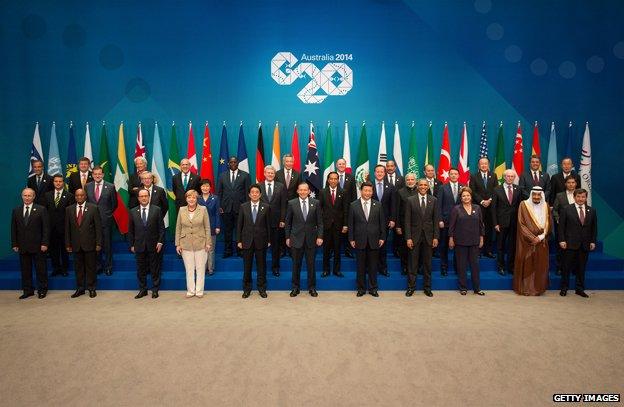Is the global economy headed for the rocks?
- Published
- comments

Well David Cameron, perhaps learning a lesson from his stockbroker father, got his timing right.
On the morning that he warns (in the Guardian) that red lights are flashing on the dashboard of the global economy, Japan announces that it has unexpectedly crashed into recession.
Japan is still the world's third biggest economy. And its economic contraction, which caught markets by surprise, coincides with the prolonged flatlining of the eurozone (which was confirmed on Friday, external) and what looks like a long-term deceleration of growth in China.
Apart from India and Mexico, most of the rest of the developing world and the so-called Brics - notably Brazil and Russia - are finding the going much tougher.
There are two apparent beacons in the gloom - the UK and US, where annual growth in national income is around 3%.
So what do the US and UK have in common?
They have central banks that have kept the cost of money cheaper than it has ever been for five years, their public-sector austerity has been less severe than billed, and their labour markets are more flexible than most in the developed world.
In both countries, these are conditions that have encouraged consumers to spend - and are also spurring companies to invest (though only latterly in the UK).
The worry, in the UK in particular, is that this reliance on domestic spending or demand will before too long see the economies' already high indebtedness rising again (as I implied, this seems less of a threat in the US, where the government's deficit is falling quite fast - in stark contrast to what is happening in the UK).
It is also notable that the fruits of growth are being harvested in huge numbers of new jobs but not in rising living standards. Especially for those with low and intermediate skills, wages remain under intense pressure. The rewards are being reaped disproportionately by those at the apex of the income pyramid.
As for Japan, its woes are to a large extent of its own making - a new sales tax, introduced by prime minister Abe, that crushed consumer spending and business confidence.
What the generally anaemic condition of the global economy shows - yet again - is the perils of national governments pursuing their putative national economic interests in this era of globalisation, of inescapable interconnectedness.
As just one example, it might well be perfectly rational for Germany to aim to balance its budget next year and generate surpluses for years to come if it was an economic island, but as the engine of growth for the eurozone many would argue this is prudence that acts as an unhelpful dampener on its neighbours' recovery.
Now this weekend's meeting of the government heads of the G20 club of the world's most powerful economies tried to face up to the reality of the inter-connected world.

Its communique contains ambitious pledges to open up trade, to jointly crack down on tax avoidance by multinationals, to force disclosure of the corrupt owners of shell companies who steal wealth (often from emerging economies), to encourage job creation (for women in particular) and to coordinate investment in infrastructure.
The hope of the G20 leaders is that these initiatives will raise their collective incomes by $2tn, which would be helpful in a global economy whose GDP is a bit over $70tn.
Let us hope they are right. But having pored over the 20 national action plans of the G20 members, including Britain's, I could not see any spending, investment, job creation or trade initiatives of size that looked brand spanking new.
Instead what we have is a collective pledge to do what these countries have already promised to do.
It is a pledge of no backsliding - a sort of vow that never again will they thump their spouses.
About time too, you might say.
But you might also wonder, for example, where is the commitment to work as a team to reduce the massive and unsustainable indebtedness in much of the world - since there is recognition that this indebtedness is probably the big weight on global growth, but when countries try to tackle it alone they often slide into recession (hello again to Japan).
So with those red lights flashing on the global economic dashboard, as David Cameron says, it is not self-evident that adequate evasive action has been taken.